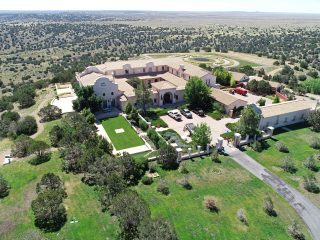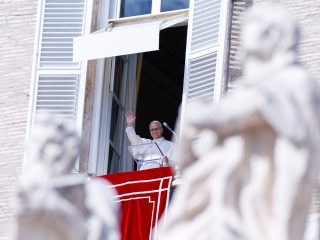
Former US President Jimmy Carter dies at 100
Jimmy Carter, the earnest Georgia peanut farmer who as U.S. president struggled with a bad economy and the Iran hostage crisis but brokered peace between Israel and Egypt and later received the Nobel Peace Prize for his humanitarian work, died at his home in Plains, Georgia, on Sunday. He was 100.
U.S. President Joe Biden directed that Jan. 9 will be a national day of mourning throughout the United States for Carter, the White House said in a statement.
“I call on the American people to assemble on that day in their respective places of worship, there to pay homage to the memory of President James Earl Carter,” Biden said.
Carter, a Democrat, became president in January 1977 after defeating incumbent Republican President Gerald Ford in the 1976 election. His one-term presidency was marked by the highs of the 1978 Camp David accords between Israel and Egypt, bringing some stability to the Middle East.
But it was also dogged by an economic recession, persistent unpopularity and the Iran hostage crisis that consumed his final 444 days in office. Carter ran for re-election in 1980 but was swept from office in a landslide as voters embraced Republican challenger Ronald Reagan, the former actor and California governor.
Carter lived longer than any U.S. president and, after leaving the White House, earned a reputation as a committed humanitarian. He was widely seen as a better former president than he was a president – a status he readily acknowledged.
World leaders and former U.S. presidents paid tribute to a man they praised as compassionate, humble and committed to peace in the Middle East.
“His significant role in achieving the peace agreement between Egypt and Israel will remain etched in the annals of history,” said Egyptian President Abdel Fattah al-Sisi in a post on X.
The Carter Center said there will be public observances in Atlanta and Washington. These events will be followed by a private interment in Plains, it said.
Final arrangements for the former president’s state funeral are still pending, according to the center.
In recent years, Carter had experienced several health issues including melanoma that spread to his liver and brain. Carter decided to receive hospice care in February 2023 instead of undergoing additional medical intervention. His wife, Rosalynn Carter, died on Nov. 19, 2023, at age 96. He looked frail when he attended her memorial service and funeral in a wheelchair.
Carter left office profoundly unpopular but worked energetically for decades on humanitarian causes. He was awarded the Nobel Peace Prize in 2002 in recognition of his “untiring effort to find peaceful solutions to international conflicts, to advance democracy and human rights, and to promote economic and social development.”
Carter had been a centrist as governor of Georgia with populist tendencies when he moved into the White House as the 39th U.S. president. He was a Washington outsider at a time when America was still reeling from the Watergate scandal that led Republican Richard Nixon to resign as president in 1974 and elevated Ford from vice president.
“I’m Jimmy Carter and I’m running for president. I will never lie to you,” Carter promised with an ear-to-ear smile.
Asked to assess his presidency, Carter said in a 1991 documentary: “The biggest failure we had was a political failure. I never was able to convince the American people that I was a forceful and strong leader.”
Despite his difficulties in office, Carter had few rivals for accomplishments as a former president. He gained global acclaim as a tireless human rights advocate, a voice for the disenfranchised and a leader in the fight against hunger and poverty, winning the respect that eluded him in the White House.
Carter won the Nobel Peace Prize in 2002 for his efforts to promote human rights and resolve conflicts around the world, from Ethiopia and Eritrea to Bosnia and Haiti. His Carter Center in Atlanta sent international election-monitoring delegations to polls around the world.
A Southern Baptist Sunday school teacher since his teens, Carter brought a strong sense of morality to the presidency, speaking openly about his religious faith. He also sought to take some pomp out of an increasingly imperial presidency – walking, rather than riding in a limousine, in his 1977 inauguration parade.
The Middle East was the focus of Carter’s foreign policy. The 1979 Egypt-Israel peace treaty, based on the 1978 Camp David accords, ended a state of war between the two neighbors.
Carter brought Egyptian President Anwar Sadat and Israeli Prime Minister Menachem Begin to the Camp David presidential retreat in Maryland for talks. Later, as the accords seemed to be unraveling, Carter saved the day by flying to Cairo and Jerusalem for personal shuttle diplomacy.
The treaty provided for Israeli withdrawal from Egypt’s Sinai Peninsula and establishment of diplomatic relations. Begin and Sadat each won a Nobel Peace Prize in 1978.
By the 1980 election, the overriding issues were double-digit inflation, interest rates that exceeded 20% and soaring gas prices, as well as the Iran hostage crisis that brought humiliation to America. These issues marred Carter’s presidency and undermined his chances of winning a second term.
HOSTAGE CRISIS
On Nov. 4, 1979, revolutionaries devoted to Iran’s Ayatollah Ruhollah Khomeini had stormed the U.S. Embassy in Tehran, seized the Americans present and demanded the return of the ousted shah Mohammad Reza Pahlavi, who was backed by the United States and was being treated in a U.S. hospital.
The American public initially rallied behind Carter. But his support faded in April 1980 when a commando raid failed to rescue the hostages, with eight U.S. soldiers killed in an aircraft accident in the Iranian desert.
Carter’s final ignominy was that Iran held the 52 hostages until minutes after Reagan took his oath of office on Jan. 20, 1981, to replace Carter, then released the planes carrying them to freedom.
In another crisis, Carter protested the former Soviet Union’s 1979 invasion of Afghanistan by boycotting the 1980 Olympics in Moscow. He also asked the U.S. Senate to defer consideration of a major nuclear arms accord with Moscow.
Unswayed, the Soviets remained in Afghanistan for a decade.
Carter won narrow Senate approval in 1978 of a treaty to transfer the Panama Canal to the control of Panama despite critics who argued the waterway was vital to American security. He also completed negotiations on full U.S. ties with China.
Carter created two new U.S. Cabinet departments – education and energy. Amid high gas prices, he said America’s “energy crisis” was “the moral equivalent of war” and urged the country to embrace conservation. “Ours is the most wasteful nation on earth,” he told Americans in 1977.
In 1979, Carter delivered what became known as his “malaise” speech to the nation, although he never used that word.
“After listening to the American people I have been reminded again that all the legislation in the world can’t fix what’s wrong with America,” he said in his televised address.
“The threat is nearly invisible in ordinary ways. It is a crisis of confidence. It is a crisis that strikes at the very heart and soul and spirit of our national will. The erosion of our confidence in the future is threatening to destroy the social and the political fabric of America.”
As president, the strait-laced Carter was embarrassed by the behavior of his hard-drinking younger brother, Billy Carter, who had boasted: “I got a red neck, white socks, and Blue Ribbon beer.”
‘THERE YOU GO AGAIN’
Jimmy Carter withstood a challenge from Massachusetts Senator Edward Kennedy for the 1980 Democratic presidential nomination but was politically diminished heading into his general election battle against a vigorous Republican adversary.
Reagan, the conservative who projected an image of strength, kept Carter off balance during their debates before the November 1980 election.
Reagan dismissively told Carter, “There you go again,” when the Republican challenger felt the president had misrepresented Reagan’s views during one debate.
Carter lost the 1980 election to Reagan, who won 44 of the 50 states and amassed an Electoral College landslide.
James Earl Carter Jr. was born on Oct. 1, 1924, in Plains, Georgia, one of four children of a farmer and shopkeeper. He graduated from the U.S. Naval Academy in 1946, served in the nuclear submarine program and left to manage the family peanut farming business.
He married his wife, Rosalynn, in 1946, a union he called “the most important thing in my life.” They had three sons and a daughter.
Carter became a millionaire, a Georgia state legislator and Georgia’s governor from 1971 to 1975. He mounted an underdog bid for the 1976 Democratic presidential nomination, and out-hustled his rivals for the right to face Ford in the general election.
With Walter Mondale as his vice presidential running mate, Carter was given a boost by a major Ford gaffe during one of their debates. Ford said that “there is no Soviet domination of Eastern Europe and there never will be under a Ford administration,” despite decades of just such domination.
Carter edged Ford in the election, even though Ford actually won more states – 27 to Carter’s 23.
Not all of Carter’s post-presidential work was appreciated. Former President George W. Bush and his father, former President George H.W. Bush, both Republicans, were said to have been displeased by Carter’s freelance diplomacy in Iraq and elsewhere.
In 2004, Carter called the Iraq war launched in 2003 by the younger Bush one of the most “gross and damaging mistakes our nation ever made.” He called George W. Bush’s administration “the worst in history” and said Vice President Dick Cheney was “a disaster for our country.”
In 2019, Carter questioned Republican Donald Trump’s legitimacy as president, saying “he was put into office because the Russians interfered on his behalf.” Trump responded by calling Carter “a terrible president.”
Carter also made trips to communist North Korea. A 1994 visit defused a nuclear crisis, as President Kim Il Sung agreed to freeze his nuclear program in exchange for resumed dialogue with the United States. That led to a deal in which North Korea, in return for aid, promised not to restart its nuclear reactor or reprocess the plant’s spent fuel.
But Carter irked Democratic President Bill Clinton’s administration by announcing the deal with North Korea’s leader without first checking with Washington.
In 2010, Carter won the release of an American sentenced to eight years hard labor for illegally entering North Korea.
Carter wrote more than two dozen books, ranging from a presidential memoir to a children’s book and poetry, as well as works about religious faith and diplomacy. His book “Faith: A Journey for All,” was published in 2018.
Shows
See AllAM Live
AM Live is NTV's morning current affairs show that sets the agenda for the day with insightful panels every weekday.
Business Redefined
Business Redefined is Kenya’s premier thought leadership platform for unpacking matters regarding economic and finance policy as well demystifying complex developments in the region’s capital markets.
Comedies
A collection of our premium content. Diam curabitur vehicula A collection of our premium content. Diam curabitur vehicula
Creatives & Coins Podcast
A podcast that dives deep into the vibrant and rapidly evolving digital creative economy in Kenya. This show explores the lives, challenges, and triumphs of individuals who are successfully navigating the gig and creative economies. From digital artists and content creators to freelance writers and tech entrepreneurs, we spotlight the voices that are shaping the future of work in Kenya.
Documentaries
A collection of our premium content. Diam curabitur vehicula A collection of our premium content. Diam curabitur vehicula
Entertainment
A collection of our premium content. Diam curabitur vehicula A collection of our premium content. Diam curabitur vehicula
Fixing The Nation
Fixing the Nation is a bold and groundbreaking show that will take an unflinching look at challenges facing the Kenyan society and the solutions that can move us forward. It is anchored by respected journalists Eric Lattif, Janet Mbugua, and Mariam Bishar. Podcast created by: Nation FM
Fixing the Nation
Fixing the Nation is a bold and groundbreaking show that will take an unflinching look at challenges facing the Kenyan society and the solutions that can move us forward. It is anchored by respected journalists Eric Lattif, Janet Mbugua, and Mariam Bishar
Full Episodes
A collection of our premium content. Diam curabitur vehicula A collection of our premium content. Diam curabitur vehicula
Gumzo La Sato
Gumzo La Sato is a live social issues show that aims to create awareness about issues affecting the larger society. The discussions range from Parenting, Marital bliss and struggles, Oppression, violence, and all matters of the Heart.
Health Diary
Health Diary is a weekly show that highlights different types of diseases/conditions and seeks ways to prevent, treat/manage them. The show debunks this through real life stories and also feature specialists in different fields, to offer medical advice on the same.
Letter To My Younger Self
Letter To My Younger Self is a podcast where guests get to write a letter to their younger self, from which Maxine formulates questions to ask them during the hour-long show.
Nation Reports
Nation Reports is a weekly podcast offers an opportunity for listeners to interact with various reporters and journey with them as they unravel the biggest most emotive stories.
One Health Lens Podcast
Discussing health matters and human stories from Kenya and across Africa. We talk big picture from people to policy, ecosystems, and everything in between. Follow us on LinkedIn: https://www.linkedin.com/company/onehealthlens
Paradise Lost
Paradise Lost peeks through the story of Louis Otieno, the times, and everything in between.
Primetime
A collection of our premium content. Diam curabitur vehicula A collection of our premium content. Diam curabitur vehicula
Speaking of GEN Z
Speaking of Gen Z brings you entertaining but meaningful conversations about a generation that is trying to navigate through adulthood. Join hosts Michelle, Jackie and Esther as they unravel all things Gen Z.
Sport On
Sport-On is a 30-minute sports magazine show on NTV and 3 hours on NATION FM. The show seeks to give the sports “fanatics” and “funatics” comprehensive and in-depth coverage of sports both locally and internationally.
Tech-over
The extent of technological growth is beyond mere acknowledgment; it has seamlessly integrated into our daily existence. A few years ago, the notion of paying electricity bills through mobile money or recharging with 'tokens' in Kenya seemed inconceivable. Online product sales were considered distant, and artificial intelligence is rapidly reshaping various facets of our lives. Amidst these technological leaps, those with a solid understanding of tech can navigate challenges, seize opportunities, and build a sustainable livelihood. Tech over Show aims to be the platform facilitating discussions among thought leaders, innovators, tech companies, and the government, addressing challenges and opportunities in Kenya's thriving tech industry.
Thamani
Thamani is a business show which is dedicated to emerging issues regarding micro, small and medium size businesses.
The Politalk podcast
This is The Politalk podcast. Here we look into the ins and outs of everything Kenyan politics. We pull no punches and have no reason to sugarcoat anything that matters to Kenyans.
The Trend
A two-hour-long live show that airs on Fridays. The show focuses on what is current in the entertainment industry, controversial and popular across all media platforms targeting those aged between 25 and 35 years.
The trend podcast
The trend podcast highlights and captures the best of banter from #TTTT segment that airs every Friday on NTV. It's the TTTT EXTRA
The Wicked Edition
The Wicked Edition with Dr. King’ori seeks to address serious issues through humour and relatable wit. It is a two-part half hour show filmed in front of a live audience
Trending
A collection of our premium content. Diam curabitur vehicula A collection of our premium content. Diam curabitur vehicula
Twende
Twende is a travel show that highlights beautiful, unique, diverse locations, people, and cultures. The show offers fresh perspectives on familiar locations and memorable experiences in new ones.
Unscripted
This Saturday evening lifestyle show lets viewers share their stories and life experiences as openly & honestly for the purpose of shifting the culture of silence.
VIP Access
VIP ACCESS is Anyiko Owoko’s YouTube and podcast show on Music and Culture dedicated to promoting Africa’s most promising talent and creatives. This podcast grants you VIP access into timeless interviews while providing a platform for rising as well as established artists across the continent. Since launching in 2018, Anyiko has interviewed over 70 African music stars.
WADR
This weekly news show aims to have all sides of debate but not be constrained by it, listen to main voices in the contest but not allow them to hold the viewers hostage, entertain debate but allow push back with all due respect.
When death do us part
In this podcast, three widowers openly speak about the process of grief, how they found themselves exposed to the emotional turmoil of losing their wives, and how society still does not know how to deal with them.
Your World
Your World is a health, wellness and variety show. It provides a platform for audiences and experts to share their experiences on how to improve or manage health issues, across Kenya and the Africa region.

